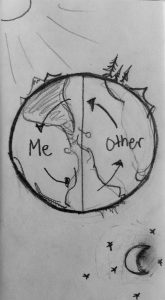What advice did you hear that resonated with you?
What implications might this have for you as a teacher?
David speaks with such passion, conviction and love. He made three very powerful statements on Monday- “You have it in you,” “You are a precious child,” and “you are a human being.” Peter talks about essential questions, well I think that these are the essential statements; things that students need to hear over and over until they truly believe it- not just about themselves but about each other-and begin to act accordingly. What a beautiful, empowering way to create a feeling of community in the classroom.
When David spoke today about his achievements I was taken by his humility and his desire to serve his people. I was reminded of a passage in the Oleksa book where he speaks about the Yup’ik story, Eye of the Needle. He says, “Children become members of society by realizing that the purpose of their existence goes beyond satisfaction of their own selfish desires, whims, or passions. Each must become the servant of something other than, and more important than, his or herself.” (p53)
What a great perspective. I feel like as a teacher I need to be humble to be able to recognize, acknowledge and build upon the cultural collateral each student brings to the classroom. I will definitely be using these traditional native stories this fall as we read Touching Spirit Bear and The Outsiders.


